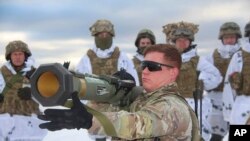While the Ukrainian battle to repel Russia is in the foreground, discussions have taken place in background expressing U.S. concerns that Kyiv's prowess on the battlefield should not extend too deeply into Moscow's land.
These behind-the-scenes discussions, which are highly sensitive and have not been previously reported, do not put explicit geographic restrictions on the use of weapons supplied to Ukrainian forces. But the conversations have sought to reach a shared understanding of the risk of escalation, three U.S. officials and diplomatic sources said.
"We have concerns about escalation and yet still do not want to put geographic limits or tie their hands too much with the stuff we're giving them," said one of the three U.S. officials, speaking on condition of anonymity.
After initially forecasting Ukraine would be overrun by Russia's much bigger military, American officials have recently voiced hopes that Ukrainian forces can win the war, and want to arm them to do so.
President Joe Biden's administration and U.S. allies have been increasingly willing to give Ukraine longer-range weaponry, including M777 howitzers, as Kyiv battles Russia's invasion forces with more success than American intelligence officials had predicted. The Pentagon's announcement last week that Denmark will provide Ukraine with Harpoon anti-ship missiles would further extend Kyiv's reach.
But U.S. intelligence has also warned about growing risks, particularly given a mismatch between Russian President Vladimir Putin's apparent ambitions and the performance of his military. The coming months could put the war on a "more unpredictable and potentially escalatory trajectory," Director of National Intelligence Avril Haines told a Senate hearing this month.
A second U.S. official, also speaking on condition of anonymity, said Washington and Kyiv had a shared "understanding" about the use of certain Western-provided weapon systems.
"So far, we've been on the same page about the thresholds," the official said.
Ukraine's defense ministry did not immediately respond to a request for comment about these background discussions on limits.
Meanwhile, Russian Foreign Minister Sergei Lavrov has warned the West that supplying weapons to Ukraine capable of hitting Russian territory would be "a serious step towards unacceptable escalation," according to remarks published on the Russian foreign ministry website on Thursday.
U.S. officials say the Biden administration is considering supplying Kyiv with the M142 High Mobility Artillery Rocket System (HIMARS), which depending on the munitions can have a range of hundreds of kilometers.
U.S. Congressman Jason Crow, who visited Ukraine in the past month and spoke with Ukrainian President Volodymyr Zelenskiy, said he was not concerned about escalation risk and that Ukraine would use the weapons being provided in the south.
"We should reiterate, as we do in all cases, that these weapons should be used responsibly," said Crow, a veteran Army Ranger who sits on the Armed Services Committee and the House Permanent Select Committee on Intelligence in Congress.
"But I'm less concerned about the issue of escalation than making sure that Ukrainians can win now and push back the Russian forces."
Douglas Lute, a former U.S. ambassador to NATO and retired Army lieutenant general, agreed Ukraine has enough Russian targets inside Ukraine to focus on.
But he acknowledged the risk for escalation and political division inside NATO should Ukraine strike deep inside Russia.
"It would spark a divisive debate inside the alliance. And, of course, the alliance doesn't want that. And neither does Ukraine," Lute told Reuters.
